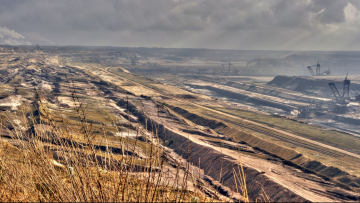Greenpeace files illegal state aid complaint for construction of nuclear plants in Romania and Bulgaria
Jan Haverkamp, Greenpeace EU policy campaigner dirty energy, tel.: +32 477 790 416, e-mail: jan.haverkamp@greenpeace.org
Crisanta Lungu, Greenpeace Energy Campaigner in Romania, tel.: +40.720 544 000, e-mail: crisanta.lungu@greenpeace.ro
Denitza Petrova, Green Policy Institute, Bulgaria, tel.: +359.889 880 908, e-mail: denitza.greens@gmail.com
Jan Haverkamp, Greenpeace EU policy campaigner dirty energy, tel.: +32 477 790 416, e-mail: jan.haverkamp@greenpeace.org
Crisanta Lungu, Greenpeace Energy Campaigner in Romania, tel.: +40.720 544 000, e-mail: crisanta.lungu@greenpeace.ro
Denitza Petrova, Green Policy Institute, Bulgaria, tel.: +359.889 880 908, e-mail: denitza.greens@gmail.com
Greenpeace has filed complaints to the European Commission over alleged illegal state aid for the construction of two nuclear reactors in Romania and two in Bulgaria. The environmental organisation argues that both countries violate EU competition rules.
Jan Haverkamp, EU energy campaigner for Greenpeace, said: "We have been investigating for many months the unfair competition conditions that have been granted to the nuclear sector in Romania and Bulgaria. We have now submitted the evidence we have collected to the European Commission, and are calling for urgent
action to correct these flagrant market distortions."
The Romanian government earmarked €220 million for the Cernavoda 3 and 4 nuclear power plant. On top of this, the state spent €350 million in taxpayers’ money for the purchase of heavy water for the new power station, as well as €800 million to
increase the capital of state utility S.N. Nuclearelectrica – S.A., with the purpose of supporting its financial contributions to the project. (1)
The Bulgarian government has invested 300 million Bulgarian Leva (€154 million) in state utility NEK for the construction of the Belene nuclear power station, as well as another 400 million Leva (€205 million) in NEK's parent holding BEH, partly also meant for Belene. (2)
According to Greenpeace, all of these investments are in violation of EU competition law.
Crisanta Lungu, Greenpeace energy campaigner in Romania, said: "It is particularly important that taxpayers’ money is spent wisely in economically difficult times. Investments in energy efficiency and renewables would bring more jobs and more energy security. Instead, Romania’s nuclear industry is swallowing investments up
like a black hole."
Denitza Petrova, from the Green Policy Institute in Sofia, Bulgaria, said: "There is still very little support from the government for energy efficiency and renewables, even though Bulgaria uses up to four times as much energy per GDP as the EU average.
Nuclear subsidies harm the healthy development of our energy sector."
Notes for editors:
(1) Hot?râre nr. 691 din 24/06/2008 (Hot?râre 691/2008), Monitorul Oficial nr. 594 din 07/08/2008: Acte similare pentru modificarea ?i completarea anexei la Hot?rârea Guvernului nr. 643/2007 privind
aprobarea Strategiei de selectare a investitorilor pentru realizarea unit??ilor 3 ?i 4 de la CNE Cernavod?;
The two Canadian-designed CANDU 6 reactors in Cernavoda are due to be built by a consortium made up of Romanian state utility S.N. Nuclearelectrica – S.A. (51%), Italian utility ENEL (9.5%), Czech utility CEZ (9,5%), German utility RWE (9,5%), Franco-Belgian company GdF Suez / Electrabel (9,5%), Spanish utility Iberdrola (5,5%) and steel giant Arcelor Mittal (5,5%). Construction is expected to begin next year.
(2) Council of Ministers decree 259 of 27 October, 2008 for granting funds from the state budget for purchasing shares by the State for increase of capital of a trade company and Council of Ministers
decree 299 of 08 December, 2008 for granting funds from the state budget for purchasing shares by the State for increase of capital of a trade company.
Belene’s new VVER 1000/466B reactors are due to be built by Bulgarian state utility NEK (51%) and German utility RWE (49%). Construction is expected to start later this year.
Copies of the relevant government decisions as well as a copy of the letters from Greenpeace to the European Commission can be obtained from the contacts above


